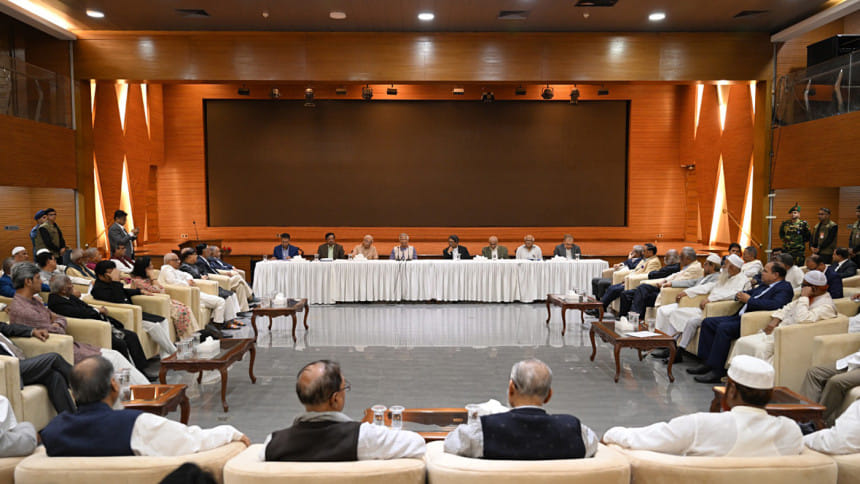A charter of reforms for next govt
The National Consensus Commission will come up with a charter based on its talks with political parties, and the next government will implement the short- and long-term reforms in line with that charter.
At the first meeting of the consensus commission yesterday, Chief Adviser Prof Muhammad Yunus said the goal of the reforms should be eliminating the legal and institutional frameworks that allow one to become an autocrat.
“In the past, autocrats took advantage of the loopholes in the legal and institutional frameworks. The reforms will be designed to ensure that all systems and institutions function in an orderly manner,” Yunus, also chief of the consensus commission, said at the meeting held at the Foreign Service Academy.
He urged some 100 leaders from 26 political parties to seize this opportunity to build a new Bangladesh so that future generations remember their contributions.
The sacrifices made by the students and masses should not go in vain, he said.
The consensus commission was formed to review and adopt the recommendations made by six key reform commissions.
The beginning of the talks marks the conclusion of the first phase of the interim government, the chief adviser said in his opening remarks.
“Reform commissions have made their suggestions. Now it is our duty to decide how many of these we accept, how quickly we adopt them, and how we proceed.”
The discussions on reforms are not academic, he said, addressing the political parties. “It is your responsibility. You represent the people and you must decide how to fix the structure of the society.”
Yunus said the interim government took power amid disorder. But support from people and political parties enabled it to face challenges.
“There could be some fresh turmoil. Those who had been rejected and ousted by the people are desperate to return. We need to stay united, strong, and focused.”
As the government has overwhelming international support, “other forces cannot take advantage”.
The international community doesn’t buy “their narratives”.
“They even attempted to sell the story to Donald Trump, but it was futile.”
The propaganda about Bangladesh has fallen flat, as the UN report clearly states who did what, he observed.
NATIONAL CHARTER
Prof Ali Riaz, co-chair of the consensus commission, said discussions between political parties and the commission will lead to the creation of a national charter.
The party that gains power will then implement both short-term and long-term reforms based on this charter.
This charter will act as guidelines on how the country will be governed. “It will also contain a roadmap to a new Bangladesh.”
The commission will hold dialogues with all political parties individually and in groups, said Riaz, adding that there would be “unofficial discussions with the parties too”.
Talking to reporters, BNP Secretary General Mirza Fakhrul Islam Alamgir said, “We hope a minimum consensus on reform will be reached soon. Based on that, the national election will be held without any delay. This is our expectation.
“We made it clear that local government elections must be held after the national election.”
Jamaat-e-Islami Nayeb-e-Ameer Abdullah Muhammad Taher said, “It is our position that once the reform commission makes its final decision, the election should be held. The chief adviser said the election will be held in December. We are observing how it goes.”
Leaders of several political parties said holding local government polls before the national election would result in bloodshed.
Hasnat Abdullah, convener of Students Against Discrimination, said, “All political parties have reached the consensus that the Awami League will be irrelevant in Bangladesh.
“We have urged the interim government to take legal steps to ban the Awami League… As a first step, we demand the cancellation of their registration.”
Several Islamist party leaders said they would reject reform proposals that contradict the Quran and Sunnah. They also criticised the proposal to include pluralism as a fundamental principle of the constitution.
They also demanded a ban on the AL.
Nagorik Oikya President Mahmudur Rahman Manna said, “Some participants in the meeting have demanded that Islam remain the state religion. They also insisted that the constitutional provisions related to Islam should not be altered and expressed dissatisfaction with some of the proposals.”
However, he said, in a democracy, pluralism means embracing a diversity of opinions.
Jatiya Nagorik Committee Convener Nasir Uddin Patwary said the processes of constituent assembly, national election, and reforms should go on simultaneously.
“We have begun the struggle for a new constitution and constituent assembly elections to put the last nail in the coffin of fascism. The government has started the struggle for reforms; we have started the struggle for creating a new constitution,” he said.
Zonayed Saki, chief coordinator of Gono Samhati Andolon, said the national election should be the priority. “Reforms are necessary for elections, and elections are also necessary to make the reforms complete … The upcoming election should be considered a crucial chapter in completing the reforms.”
Bangladesh Jatiya Party Chairman Andaleeve Rahman Partha said his party didn’t want local government elections before the national election.
“No reforms should delay the national election,” he added.
Mojibur Rahman Monju, member secretary of Amar Bangladesh Party, said if the next national election is held before making the reforms, then the election may end up being called into question.
LondonGBDESK//



Comments are closed.